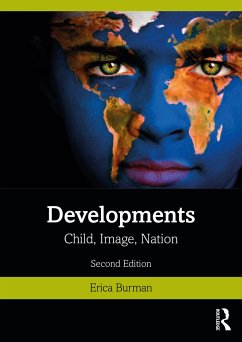How does developmental psychology connect with (what used to be called) the developing world? What do cultural representations indicate about the contemporary politics of childhood? How is concern about child sexual exploitation linked to wider securitization anxieties? In other words: what is the political economy of childhood, and how is this affectively organized? This new edition of Developments: Child, Image, Nation, fully updated, is a key conceptual intervention and resource, reflecting further on the contexts and frameworks that tie children to national and international agendas.
A companion volume to Burman's Deconstructing Developmental Psychology (third edition, 2017) this volume helps explain why questions around children and childhood, including their safety, welfare, their interests, abilities, sexualities and their violence, have so preoccupied the late twentieth and twenty-first centuries, showing how the frames for these concerns have extended beyond their Euro-US contexts of origination. In this completely revised edition, Burman explores changing debates and contexts, offering resources for interpreting continuities and shifts in the complex terrain connecting children and development. Through reflection on an increasingly globalised, marketised world, that prolongs previous colonial and gendered dynamics in new and even more insidious ways, Developments analyses the conceptual paradigms shaping how we think about and work with children, and recommends strategies for changing them. Drawing in particular on feminist and post-development literatures, as well as original and detailed engagement with social theory, it illustrates how and why reconceptualising notions of individual and human development, including those informing models of children's rights and interests, is needed to foster more just and equitable forms of professional practice with children and their families.
Burman offers an important contribution to a set of urgent debates engaging theory and method, policy and practice across all the disciplines that work with, or lay claim to, children's interests. A persuasive set of arguments about childhood, culture and professional practice, Developments is an invaluable resource to teachers and students in psychology, childhood studies, and education as well as researchers in gender studies.
A companion volume to Burman's Deconstructing Developmental Psychology (third edition, 2017) this volume helps explain why questions around children and childhood, including their safety, welfare, their interests, abilities, sexualities and their violence, have so preoccupied the late twentieth and twenty-first centuries, showing how the frames for these concerns have extended beyond their Euro-US contexts of origination. In this completely revised edition, Burman explores changing debates and contexts, offering resources for interpreting continuities and shifts in the complex terrain connecting children and development. Through reflection on an increasingly globalised, marketised world, that prolongs previous colonial and gendered dynamics in new and even more insidious ways, Developments analyses the conceptual paradigms shaping how we think about and work with children, and recommends strategies for changing them. Drawing in particular on feminist and post-development literatures, as well as original and detailed engagement with social theory, it illustrates how and why reconceptualising notions of individual and human development, including those informing models of children's rights and interests, is needed to foster more just and equitable forms of professional practice with children and their families.
Burman offers an important contribution to a set of urgent debates engaging theory and method, policy and practice across all the disciplines that work with, or lay claim to, children's interests. A persuasive set of arguments about childhood, culture and professional practice, Developments is an invaluable resource to teachers and students in psychology, childhood studies, and education as well as researchers in gender studies.
This brilliant book is an indispensable tool and urgent reminder for all education and childhood studies scholars to the imperative of interrogating cultural associations and affective relations mobilised around the image of the child, including those underpinning their own research. The new introductions for each chapter reflect the most current socio-political, economic and theoretical developments to re-contextualize and re-position the astute theoretical resources developed. It offers essential reference points to the various movements in understanding and researching the intersections of child and international development with newly written chapters about transnationality and childhood.
Zsuzsa Millei, Professor of Early Childhood Education, Tampere University, Finland
Erica Burman's Developments is a masterpiece of reading for submerged constitutive relations: between child and adult, North and South, psychological expertise and social policy .... Tracking the peculiar rhetorical powers of discourses on childhood, the chapters move deftly through a wide range of materials, from aid campaign to classical tragedy to soap commercial to Indian cinema. This new edition extends the transnational frame and updates the conjunctural analysis, taking account of expanding psychologization, austerity, nationalist sentiment, and nostalgic reconstructions of boyhood in the context of feminized labour.
Jennifer Henderson, Associate Professor, Department of English and School of Indigenous and Canadian Studies, Carleton University, Canada
Burman places developmental psychology in ongoing political, development and environmental challenges worldwide, thus offering us an opportunity to see what we are likely to miss if our narratives of human development are monolithic, linear and sans social responsibility ... This book should become a mandatory reading for disciplines such as education, psychology, psychiatry, and development studies as a reminder of the kinds of reflections we need to do before we buy into a single narrative of development.
Manasi Kumar, Senior Lecturer, Department of Psychiatry, University of Nairobi, Kenya
Erica Burman's Deconstructing Developmental Psychology showed in the early 1990's how hegemonic economic models and gender relations were reproduced by psychological theories of development, and subsequently, how important it was to address specific developments, their particular economic and social context, away from grand abstractions and homogeneous developmental models ... In this 2nd edition of Developments, Burman pushes her critical understanding of development further while arguing for the importance of attending to these international perspectives. This completely revised and astounding edition, which includes a new introduction to each chapter and a new section on transnational dynamics, could well work as a proper inoculation against extreme right wing developments worldwide ... while reflecting, in particular, on everyday childhood issues and concerns.
Ángel Gordo, Lecturer in Sociology, Universidad Complutense of Madrid, Spain
Erica Burman is a leading voice in critical (developmental) psychology, and I highly recommend her second edition of Developments: Child, Image, Nation because her transdisciplinary and transnational critique of both psychological and economic developments ... provides her readers with a post-/anti-developmental political conceptualization of childhood, which is both psychosocial and anti-capitalist. Burman shows us that the discourse of psycho-economic development, as exemplified by signifiers like 'growth', 'change', 'stage', 'cycles', 'investment', and 'progress', is a modern rhetoric that is ideologically sustained by the colonial logic of capitalist imperialism, which is inherently oppressive .... This is why Burman frames children, in the context of her critique of the discourse of psycho-economic development, as the oppressed alongside other historically oppressed groups or nations in the Global South and beyond ... In sum, Burman's book undoes the dangerous fantasy of development by deconstructing the complex network of discourses and practices on which it is based.
Robert K. Beshara, Assistant Professor of Psychology and Humanities, Northern New Mexico College
Zsuzsa Millei, Professor of Early Childhood Education, Tampere University, Finland
Erica Burman's Developments is a masterpiece of reading for submerged constitutive relations: between child and adult, North and South, psychological expertise and social policy .... Tracking the peculiar rhetorical powers of discourses on childhood, the chapters move deftly through a wide range of materials, from aid campaign to classical tragedy to soap commercial to Indian cinema. This new edition extends the transnational frame and updates the conjunctural analysis, taking account of expanding psychologization, austerity, nationalist sentiment, and nostalgic reconstructions of boyhood in the context of feminized labour.
Jennifer Henderson, Associate Professor, Department of English and School of Indigenous and Canadian Studies, Carleton University, Canada
Burman places developmental psychology in ongoing political, development and environmental challenges worldwide, thus offering us an opportunity to see what we are likely to miss if our narratives of human development are monolithic, linear and sans social responsibility ... This book should become a mandatory reading for disciplines such as education, psychology, psychiatry, and development studies as a reminder of the kinds of reflections we need to do before we buy into a single narrative of development.
Manasi Kumar, Senior Lecturer, Department of Psychiatry, University of Nairobi, Kenya
Erica Burman's Deconstructing Developmental Psychology showed in the early 1990's how hegemonic economic models and gender relations were reproduced by psychological theories of development, and subsequently, how important it was to address specific developments, their particular economic and social context, away from grand abstractions and homogeneous developmental models ... In this 2nd edition of Developments, Burman pushes her critical understanding of development further while arguing for the importance of attending to these international perspectives. This completely revised and astounding edition, which includes a new introduction to each chapter and a new section on transnational dynamics, could well work as a proper inoculation against extreme right wing developments worldwide ... while reflecting, in particular, on everyday childhood issues and concerns.
Ángel Gordo, Lecturer in Sociology, Universidad Complutense of Madrid, Spain
Erica Burman is a leading voice in critical (developmental) psychology, and I highly recommend her second edition of Developments: Child, Image, Nation because her transdisciplinary and transnational critique of both psychological and economic developments ... provides her readers with a post-/anti-developmental political conceptualization of childhood, which is both psychosocial and anti-capitalist. Burman shows us that the discourse of psycho-economic development, as exemplified by signifiers like 'growth', 'change', 'stage', 'cycles', 'investment', and 'progress', is a modern rhetoric that is ideologically sustained by the colonial logic of capitalist imperialism, which is inherently oppressive .... This is why Burman frames children, in the context of her critique of the discourse of psycho-economic development, as the oppressed alongside other historically oppressed groups or nations in the Global South and beyond ... In sum, Burman's book undoes the dangerous fantasy of development by deconstructing the complex network of discourses and practices on which it is based.
Robert K. Beshara, Assistant Professor of Psychology and Humanities, Northern New Mexico College








